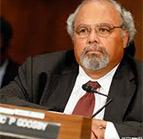The Office of Global Health Diplomacy: A Focus on Country Ownership and Sustainability
The growing concern about the political and social impacts of HIV/AIDS and other emerging infectious diseases has led policymakers to place greater attention on health in the context of foreign policy and diplomatic activity, and global health development is increasingly being seen as more integral to US international trade and security interest.
Ambassador Eric Goosby (see photo to right), head of the State Department’s new Office of Global Health Diplomacy and U.S. Global AIDS coordinator, spoke about the goals of the recently established office at a town hall meeting at the Kaiser Family Foundation in late February.
The office is intended to guide diplomatic efforts to advance the United States’ global health mission to improve and save lives and foster sustainability. To do so, the office will aim to integrate the U.S. government’s international health aid efforts and help governments in developing countries create sustainable healthcare funding and care models. An integral part of the local response will focus on technical cooperation and assistance, supporting the expansion of government health ministries and helping them design plans that meet their populations’ needs.
The main theme of Dr. Goosby’s remarks were in line with PEPFAR’s Blueprint for an AIDS-free Generation: local country ownership and long-term sustainability.
However, a number of attendees were concerned about the inclusion of civil society organizations and marginalized populations in the local response, citing a recent Institute of Medicine report that stressed the importance of the input of these populations in order to achieve long-term sustainability. Ambassador Goosby agreed that community members needed to be included in the planning process: “We do need to figure out a meaningful way to have community input into that process of planning.”
In addition to including a wide range of stakeholders in a country’s planning process, there is a pressing need to grow local capacity to meet long-term sustainability goals. Ambassador Goosby asserted that partner countries must be able to understand how a disease moves through the population, the available responses they are able to take to combat the disease, and the commitment, leadership, and resources needed in order to effectively implement a sound response. Although current programs deliver technical assistance to fight diseases at the population level, sustaining the technical assistance so that in turn it leads to capacity expansion is the challenge programs will now face.






Leave a Reply
Want to join the discussion?Feel free to contribute!